Livestock Guardian Animal – Before we moved to our rural property, we knew we would need some help protecting our future livestock from the local coyotes, black bears, and cougars. Here’s what we learned when deciding if we needed a livestock guardian animal.
We knew that smaller mammals and rodents would also be an issue around poultry. Therefore, we started to search for ways to keep our animals safe. We were surprised to discover a group of animals categorized as livestock guardians.
Different guardian animal – herd protector
There are three main classes of Livestock Guardian Animal that have proven to be excellent protectors of livestock in various situations.
Two species of livestock guardian animals — donkeys and llamas — naturally dislike canines and are effective against wolves, coyotes, and marauding dogs.
The third Livestock Guardian Animal class consists of several specific breeds of large dogs with strong instincts to protect their charges and aggressively fend off many types of predators.
As a group they are called livestock guardian dogs, or LGDs. Choosing a Livestock Guardian Animal must include consideration of several factors.
What to consider before getting a livestock guardian animal
- Predators in your area
- Stock you want to protect
- Property size and fencing
- What will the guardian animals need
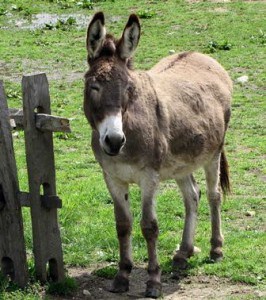
- Vigilant Livestock Guardian Donkey
Do you need a livestock guardian animal?
If you have no predator issues, you may not need a guardian animal. Some nuisance animals can be eradicated by other means, such as electric fences and mousetraps.
Securely-built chicken coops can deter the entrance of raccoons and weasels. A good barking farm dog can ward off some would-be intruders.
But if you have large predators in your area or regular visits by animals seeking free meals, it might be time to put a livestock guardian animal in with your stock.
How many and what kind of predators do you have in your vicinity?
Do you see small mammals, packs of coyotes, wandering bears, wolves or cougars? A donkey will fend off individual canines and often small packs as well. Llamas will fight one canine but are ineffective against a pack.
Neither donkeys nor llamas are effective against bears, wildcats, small mammals, snakes, or rodents.
Livestock guardian dogs will oppose anything that does not belong in its territory, including individual canines, packs of canines, wild cats, bears, and most other aerial and ground predators.
Therefore, if your predator problem is an occasional lone canine, any of the three types will do.
For small packs of canines, a donkey or LGD will work. For larger canine packs and non-canine predators, a pair of livestock guardian dogs is the best option.
What type of livestock do you want to guard?
All three guardian types can be used with large livestock (horses and cows) and medium sized livestock (goats, sheep, pigs, and miniature cattle breeds).
LGDs can be trained to walk among backyard chickens without injuring them, donkeys and llamas may accidentally or intentionally kick or step on birds.
While donkeys and llamas may bond to their pasture mates, their defensive actions are more to protect their territory than to safeguard the stock.
LGDs bond to the stock or humans they are to protect, and will fend off any perceived threat or anything that does not belong in the area.
More relational and interactive with their charges than are donkeys or llamas, LGDs will assist with goat and sheep birthings and give special attention to stock that is ill or injured.
If you have chickens and smaller livestock to protect, you can consider an alpaca. Alpacas are good at deterring smaller predators away; however, alpacas cannot defend themselves. Sometimes people take on guard dogs or llamas to protect their alpacas. Learn more about alpaca vs llama.
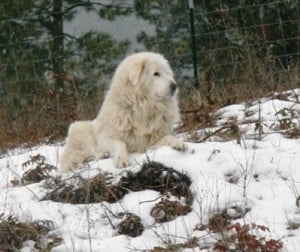
- Vigilant Maremma Sheepdog
Do you feel a need for personal protection as well as livestock defense?
Guardian dogs will bond with and protect humans as well as stock.
Donkeys and llamas will not normally accompany people as they go about their chores and tasks. They will prevent entry of unwelcome people as well as animals. They will patrol your home and yard.
Some of the livestock guardian dog breeds are wonderful with children.
How many guardian animals do you need?
Donkeys and llamas are much more effective individually than they are in pairs.
Two donkeys or two llamas will bond to each other more strongly than to the stock they are to protect, and will usually be less attentive guardians than a lone donkey or llama would be.
Therefore, for best defensive support, an individual donkey or a single llama should be with small flocks and herds of stock.
Livestock guardian dogs, on the other hand, work best in pairs and teams and will communicate from one to another as they strategically oppose intruders.
You can pen multiple LGDs with large flocks and large herds.
What type of fencing do you have or are you willing to install?
You can easily add donkeys and llamas to most livestock pastures or paddocks. They require the same type of fencing as medium to large livestock.
A livestock guardian dog needs an effective fence to prevent it from pursuing predators outside your territory and from expanding its territory to include neighbors.
Are you willing to provide separate feed and individual attention?
Donkeys and llamas will generally eat the same grass or feed as livestock they share pasture with. LGDs have different food needs from those of the stock and must be fed separately.
- Raise donkeys and llamas as livestock. They don’t need human guidance.
- Dogs require more time and effort in training and maintenance.
For the most successful operation, an LGD must have a working relationship with its human alpha figure(s) — usually one or more family members or a farm manager.
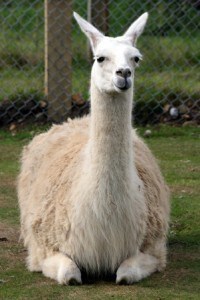
- Livestock Guardian Llama
Guardian donkeys and llama breeds?
There aren’t special breeds of donkeys or llamas that qualify them as livestock guardians. All classifications have these innate traits. In general, all donkeys and llamas have the urge to fight off canines.
The livestock guardian dog category includes several specific breeds of dogs.
Many other breeds of dogs will bark at intruders and chase them away; however, only the LGD breeds are instinctively wired to bond with stock, relentlessly deter intrusion, and fight to the death if necessary to defend their stock.
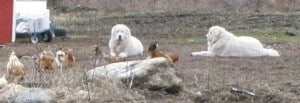
- Livestock Guardian Dog Maremmas with chickens
The LGD breeds include the Akbash, Anatolian Shepherd, Great Pyrenees, Kangal, Komondor, Kuvasz, Maremma Sheepdog, and Tibetan Mastiff.
Donkey, llama, or livestock guardian dog?
Choosing a livestock guardian animal is a personal one that depends on the individual farm, surroundings, and livestock requiring protection.
Many people have their favorites and stories of successful and ineffective guardian animals.
The important thing is to consider your predator situation and your resources, planning accordingly to protect your livestock.
The basics of caring for livestock may well be to get a livestock guardian animal. Whichever animal you choose, they can become invaluable to your family. Learn what do llamas eat to learn about their pasture foraging needs. Cattle dogs are meant for herding cattle.
Livestock guardian related content:
How to Be a Livestock Guardian Dog
Keep Your Dog Healthy and Fit
Best Organic Dog Food Comparison – We Found the Best
Suffolk Sheep ~ The Breed to Raise for Meat and Wool

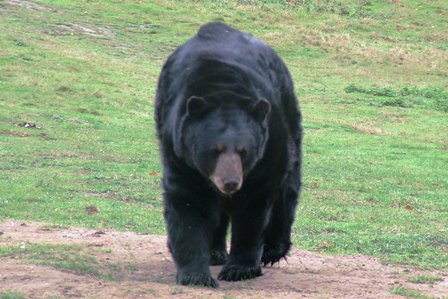
Thanks for the tips! We’re looking at five acres in coyote / cougar country and are looking for a LGD who will be effective at protecting a pastured poultry operation as well as be good with our young son.
I hadn’t thought about the fact that some animals would be better against a pack of coyotes than others. Thanks so much!
You’re welcome, Stacey! We too raise pastured poultry in coyote/cougar country and we have 13 precious grandchildren. Our Maremma sheepdogs are awesome with the poultry and the children, as well as letting the coyotes know they need to pass on by.
We have a followup post on the different livestock guardian breeds coming soon!
That’s good to know! Maremma are top on my hubby’s list. Looking forward to your follow up!
Hi Patty,
We’re sorry to hear about your piglet. It’s never easy to lose an animal like that.
Any of the true LGD breeds that were born in a working environment might work well for you. They would instinctively deter any of those animals you mention and fight if necessary to defend their stock. Most of the LGDs can be used to protect to any type of livestock. Once they have bonded to the stock they will consider it theirs to watch over. If you’re in North America (looks like Canada?), the easiest LGD breeds to find would be Maremmas, Anatolian Shepherds, and Great Pyrenees.
The only LGD breed we have owned is Maremmas. We can vouch for their faithfulness to defend chickens, pigs, and people from predators. We have bears and coyotes on our property but see no signs of them near our home or livestock. Last year a hawk did kill a chick so we aren’t sure what our dogs think about aerial predators, but they are very diligent about anything they see, hear, or smell at ground level. I know some LGDs are also vigilant about aerial predators.
I would suggest looking at info on the various LGD breeds (see https://rurallivingtoday.com/livestock/livestock-guardian-dog/ for links) and see if one breed stands out in your mind. Then find a good breeder on a working farm where the puppies learn their job from other dogs. One challenge is that it’s hard to find capable adult LGDs, but it takes a puppy a good year or more to become a solid guardian. Many rescue LGDs have had working challenges, but occasionally a good working dog is available due to downsizing of stock or a farmer retiring.
Keep us posted–and let us know if you have any more questions.
Marie
Hello,
We just had a bear issue with one of our piglets. We are raising berkshire pigs and last Friday a bear attacked and fatally wounded a piglet. No one was home at the time and it was a broad daylight attack. The bear did not get the piglet as it was found in the pig house already dead. The bear returned the next night and was destroyed. What type of LGD would work best for the pigs? We also have chickens which have aerial assaults as well as coyote, foxes, etc. We have cougar, bear, lynx and bob cats as well for predators … oh yah and the wolf is now a huge problem for the cattle on range … we do not have cattle but the wolves are there and creating many issues for the ranchers in our area. Thanks Patty
If anyone is just getting started & would like to know more about Livestock Guardian Dogs, I own & manage some really great educational groups on Facebook. I included the link to one, Learning About LGDs. Feel free to reply if you want the direct link or more information. We cover training, breeding, how to find a good rescue, what breed or breeds are best for you, troubleshooting, & support. Come join us, we love newcomers!
Wow, this was usefull. Keep writing this kind of emails, you will get a lot of people to this article if you continue writing this.
one very positive difference in a donkey and a dog.. coyotes tend to not even come around if you have donkeys :-) a dog is only good after the coyote shows up. I have both… and my Anatolian cross Maremma dogs jump the fence and go get in the neighbors trash all the time and yesterday he threatened to shoot my dog. Nobody’s ever threatened to shoot my donkeys :-)
Donkeys also keep foxes raccoons possums and other things away and I have proof of this because now I have a wild rabbit population I never had when I just had dogs and I have wild turkeys running everywhere and gopher tortoises I didn’t have those when I only had dogs.
I’m not against people having dogs cuz I have my livestock Guardian dogs to keep people away.. the donkeys keep my livestock safe.
A few more facts… dogs are only good for a few years donkeys live to be 40. Donkeys don’t bother your fences they don’t dig holes out or jump fences and roam.. they don’t eat chickens and I’ve never had one stomp any of my poultry either and I have about 30 donkeys at any given time. Donkeys don’t get heartworms they don’t need special treatment they get worms when you worm your other livestock.
I’ve never had to drive 15 miles to go pick up my room in donkeys but I have had to drive that far to pick up Great Pyrenees before that escaped and don’t come back to guard their quote herds…. and I’ve never had a donkey kill any of my goats alpacas sheep horses cows calves I bet it couldn’t happen but I’ve never had that happen and I have a lot a lot of donkeys at all times. China is killing off the world’s donkeys do yourself a favor and put one on your farmstead and you’ll enjoy the company the character of it and you won’t have any coyotes show up.
Thanks for your information we are just starting on 20 acres have 3 heifers coming and want to keep them safe at all times. Love my dog’s and most animals but not when they kill my chickens and turkeys.